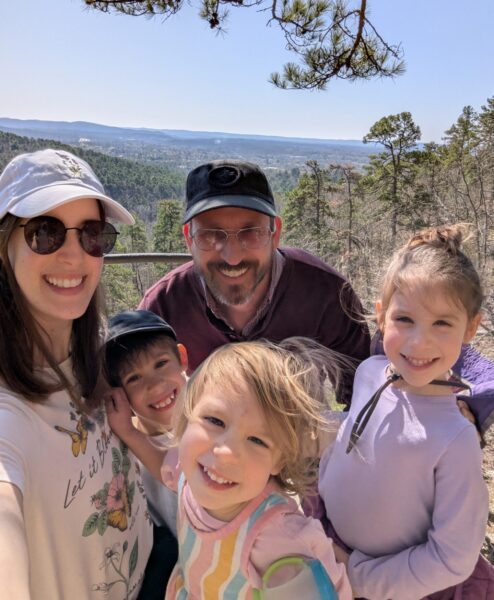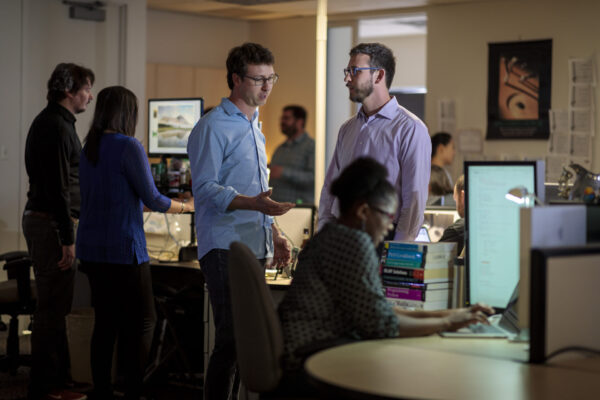Dr. Malachi Griffith – Research in Action
With several family members impacted by cancer, V Foundation grantee Malachi Griffith, Ph.D., knew that he wanted to pursue a career that would improve patient outcomes and give families more time with the people they love. This inspiration kicked off his journey into the cancer research field, and the Griffith Lab is now leading the way in innovative technology that will provide new and effective treatment options to patients across many cancer types.
A Personal Connection to Cancer Research

For Malachi Griffith, Ph.D., V Foundation grantee and professor at Washington University School of Medicine, working in science always felt like his calling.
His interests leaned toward the science and technology space, but after two personal experiences with cancer, he began exploring cancer research as a career path that could make an impact for families like his own. During Griffith’s high school years, his mother was diagnosed with breast cancer. She underwent treatment, but they lost her quickly to the disease. Several years after that loss, his brother was diagnosed with Ewing Sarcoma, a rare bone cancer that primarily affects children and young adults.
“He wound up being successfully treated and is still doing well to this day. That was about 20 years ago,” said Griffith. “I saw during a very critical juncture in a person’s life how things could not work well for a cancer patient [in my mom’s situation], and then the amazing care my brother got and how successful that was. Just a few years earlier, that may not have been the case for him.”
Griffith was inspired by the advancements happening throughout his brother’s experience. He also saw the collaborative efforts, research and expertise required to achieve that progress, all of which helped solidify his desire to pursue cancer research.
“From a fairly early stage, I thought about ways to get the background knowledge I would need to do something useful in cancer – areas like biology, genetics, genomics – but also how computation approaches might be useful,” said Griffith. “It worked out really fortuitously because at that time, there was an amazing transformation happening in the biological sciences with massive data sets becoming more routine within biology.”
Advancements in Tumor Biology
Dr. Griffith and his colleagues started looking at the deep molecular characterization of tumors and how that information could help them better understand tumor biology, and more specifically, identify vulnerabilities of these tumors.
By taking the tumor’s sequence information, they can investigate critical questions that will help guide the future of cancer treatments. For example: How can they use that information to better diagnose tumors? How aggressive is the tumor and can they create assays for tracking its response to therapy? Once a patient achieves remission, how can they monitor for signs of relapse or design therapies to prevent relapse?
“A lot of the work focused on identifying specific DNA variations that can be interpreted in a clinical way,” said Griffith. “For example, if you have a variant, it could mean a certain subtype of cancer that behaves differently from other subtypes, or it could mean you’ll respond more or less to certain therapies.”
Their studies found that many unique tumor characteristics can be identified, but not all are immediately actionable with a treatment plan. However, this data can be used in other ways, such as creating personalized tracking assays, monitored through a blood test, to detect how a tumor is responding to therapy.
Dr. Griffith is also diving deeper into neoantigens, small pieces of protein that are unique to tumor cells and not present in normal cells. Scientists hope to train the immune system to identify and attack specific tumor cells using these markers through options like vaccines or cell-based therapies.
“We’re developing tools and pipelines and algorithms to identify these neoantigens,” he said. “And we’re trying to do it in a way that makes this capability readily available to others through open access tools and resources to try to broadly enable these kinds of therapy applications.”
Dr. Griffith’s team has been part of collaborative clinical trials across multiple cancer types, including triple negative breast cancer, pancreatic, prostate and more, to monitor the effectiveness of these novel vaccines and therapies.
Critical Cancer Research Funding
The Griffith Lab was one of the first to translate a patient’s genomic data into a neoantigen vaccine effectively, and they’ve gone on to publish and share their work widely – driving forward lifesaving research. Dr. Griffith notes that it’s not always easy to receive funding for this critical translational work.

“There’s a lot of algorithm and software development needs here that are difficult to get funded through usual funding streams,” said Griffith of the importance of the V Foundation’s grant award. “We’re really excited and really grateful for the V Foundation funding we’ve had in the past and we’re looking forward to applying for more in the future. I feel like we’ve come a long way, but we have a long way to go.”
With nearly 300 personalized cancer vaccines that have been designed using Dr. Griffith’s tools in clinical trials, he recognizes the growth opportunities still ahead for patient access. The vaccines used in the trials were utilized in patients who had already been diagnosed with cancer to teach their bodies to identify specific cancer cells and prevent relapse.
“Almost every tumor essentially has some potential for neoantigen targeting and it seems like the side effects associated with this treatment are quite tolerable compared to many other cancer therapies,” he said. “You could imagine a future where we are giving the immune system a little help in a lot of cancer types.”
Through Dr. Griffith’s innovative work and leadership, a future is within reach where there are improved treatment options, fewer cancer recurrences and more lives saved.




